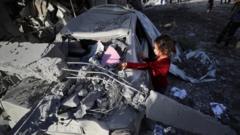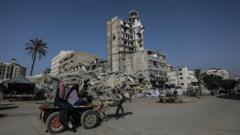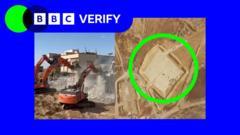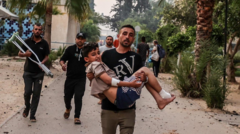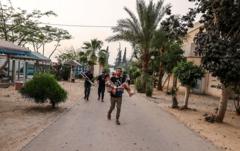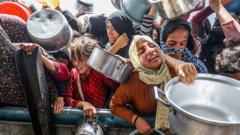### Summary: The recent airstrike on a hospital in southern Gaza highlights escalating tensions, with accusations against Israel for targeting medical facilities and Hamas’s alleged military use of such sites. Responses from medical officials and the Israeli military depict a complex battle of narratives in wartime.
### Title: Strikes on Gaza Hospital Spark Controversy Amid Ongoing Conflict

### Title: Strikes on Gaza Hospital Spark Controversy Amid Ongoing Conflict
### Description: Israeli airstrikes targeting Hamas operatives raise alarms over the impact on Gaza's healthcare system, with mixed responses from officials and advocacy groups.
The ongoing conflict in Gaza has taken a troubling turn following an Israeli airstrike on the European Gaza Hospital in Khan Younis, aimed at eliminating a senior Hamas commander, Muhammad Sinwar. This particular attack, which left at least six individuals dead and caused significant destruction to the hospital infrastructure, underscores a crucial and contentious aspect of the war: the relationship between military operations and civilian healthcare provision in the region.
Israeli officials have maintained that their military operations are justified, asserting that the hospital complex was being utilized as a command center by Hamas. However, the Director of the European Gaza Hospital, Imad al-Hout, vehemently denied these claims. He described the airstrikes, which occurred without prior warning, as devastating to the hospital’s functionality—crippling water supply, damaging walls, and forcing the evacuation of a hundred patients.
International humanitarian organizations and United Nations representatives have urged all parties in the conflict to uphold the protection of civilian infrastructures, particularly hospitals. Criticism directed at Israeli forces escalates amidst reports that the health infrastructure in Gaza is already under severe strain due to the ongoing hostilities. Health officials have recorded numerous casualties and have expressed grave concerns regarding the implications of military strikes on healthcare facilities.
In contrast, Israeli defense sources justify their actions by citing the necessity of targeting Hamas militants operating from civilian areas, framing it as an unavoidable aspect of their military strategy. This contentious narrative highlights a broader debate about the ethical considerations of warfare in densely populated regions, where civilians inevitably bear the brunt of the conflict.
As the situation unfolds, the international community watches closely, with hopes that dialogue and restraint can eventually pave the way for a more peaceful resolution, minimizing harm to those caught in the crossfire.
Israeli officials have maintained that their military operations are justified, asserting that the hospital complex was being utilized as a command center by Hamas. However, the Director of the European Gaza Hospital, Imad al-Hout, vehemently denied these claims. He described the airstrikes, which occurred without prior warning, as devastating to the hospital’s functionality—crippling water supply, damaging walls, and forcing the evacuation of a hundred patients.
International humanitarian organizations and United Nations representatives have urged all parties in the conflict to uphold the protection of civilian infrastructures, particularly hospitals. Criticism directed at Israeli forces escalates amidst reports that the health infrastructure in Gaza is already under severe strain due to the ongoing hostilities. Health officials have recorded numerous casualties and have expressed grave concerns regarding the implications of military strikes on healthcare facilities.
In contrast, Israeli defense sources justify their actions by citing the necessity of targeting Hamas militants operating from civilian areas, framing it as an unavoidable aspect of their military strategy. This contentious narrative highlights a broader debate about the ethical considerations of warfare in densely populated regions, where civilians inevitably bear the brunt of the conflict.
As the situation unfolds, the international community watches closely, with hopes that dialogue and restraint can eventually pave the way for a more peaceful resolution, minimizing harm to those caught in the crossfire.



